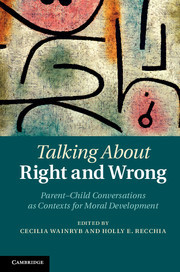Part I. Introduction: 1. Parent-child conversations as contexts for moral development: why conversations, and why conversations with parents? Cecilia Wainryb and Holly E. Recchia; Part II. Parent-Child Conversations: Contents, Contexts, and Consequences: 2. Family talk about moral issues: the toddler and preschool years Judy Dunn and Claire Hughes; 3. Remember drawing on the cupboard? New Zealand Māori, European, and Pasifika parents' conversations about children's transgressions Elaine Reese, Mele Taumoepeau and Tia Neha; 4. Taiwanese parent-child conversations for moral guidance: uncovering the ubiquitous but enigmatic process Jin Li, Heidi Fung and Eva Chian-Hui Chen; 5. Constructing moral, emotional, and relational understanding in the context of mother-child reminiscing Deborah Laible and Tia Panfile Murphy; 6. Caught red-handed: how Italian parents engage children in moral discourse and action Laura Sterponi; 7. Parent mediation of sibling conflict: addressing issues of fairness and morality Hildy Ross; 8. Judging fairness in the face of gender stereotypes: examining the nature and impact of mother-child conversations Lacey J. Hilliard and Lynn S. Liben; 9. Discussions of moral issues emerging in family conversations about science Maureen Callanan, Araceli Valle, Megan Luce and Jennifer Rigney; 10. 'Did you apologize?' Moral talk in European American and Chinese immigrant mother-child conversations of peer experiences Qi Wang and Qingfang Song; 11. Mother-child conversations about hurting others: supporting the construction of moral agency through childhood and adolescence Holly E. Recchia and Cecilia Wainryb; 12. Voice and power: constructing moral agency through personal and intergenerational narratives Robyn Fivush, Natalie Merrill and Kelly Marin; Part III. Parent-Child Conversations: Processes and Mechanisms: 13. Moral development, conversation, and the development of internal working models Ross A. Thompson and Abby C. Winer; 14. Parent-child conversations from the perspective of socialization theory Joan E. Grusec; 15. Conversations in the home: the role of dialogue and resistance in children's emerging understandings of morality, convention, and the personal Larry Nucci; 16. Constructing the good enough self: mother-child conversations and moral development from an identity framework Monisha Pasupathi; 17. Placing discursive practices front and center: a sociocultural approach to the study of early socialization Peggy J. Miller.




